Analysing the effects of globalisation on global culture and society
VerifiedAdded on 2022/10/02
|9
|3683
|37
Essay
AI Summary
This essay examines the multifaceted impacts of globalization on the formation of a global culture. It explores how globalization, driven by factors such as the internet, social media, and multinational corporations, fosters shared experiences, values, and norms across the world. The essay analyzes how these forces contribute to the homogenization of culture, including the spread of Western cultural elements and the adoption of common practices in business and daily life. It also addresses the influence of technology, transportation, and cross-border trade on shaping global consumption habits, fashion trends, and organizational cultures. Furthermore, the essay acknowledges the role of English as a global language, the impact of art and films, and the increasing interdependence among nations, concluding that globalization has led to the creation of a complex and evolving global culture.
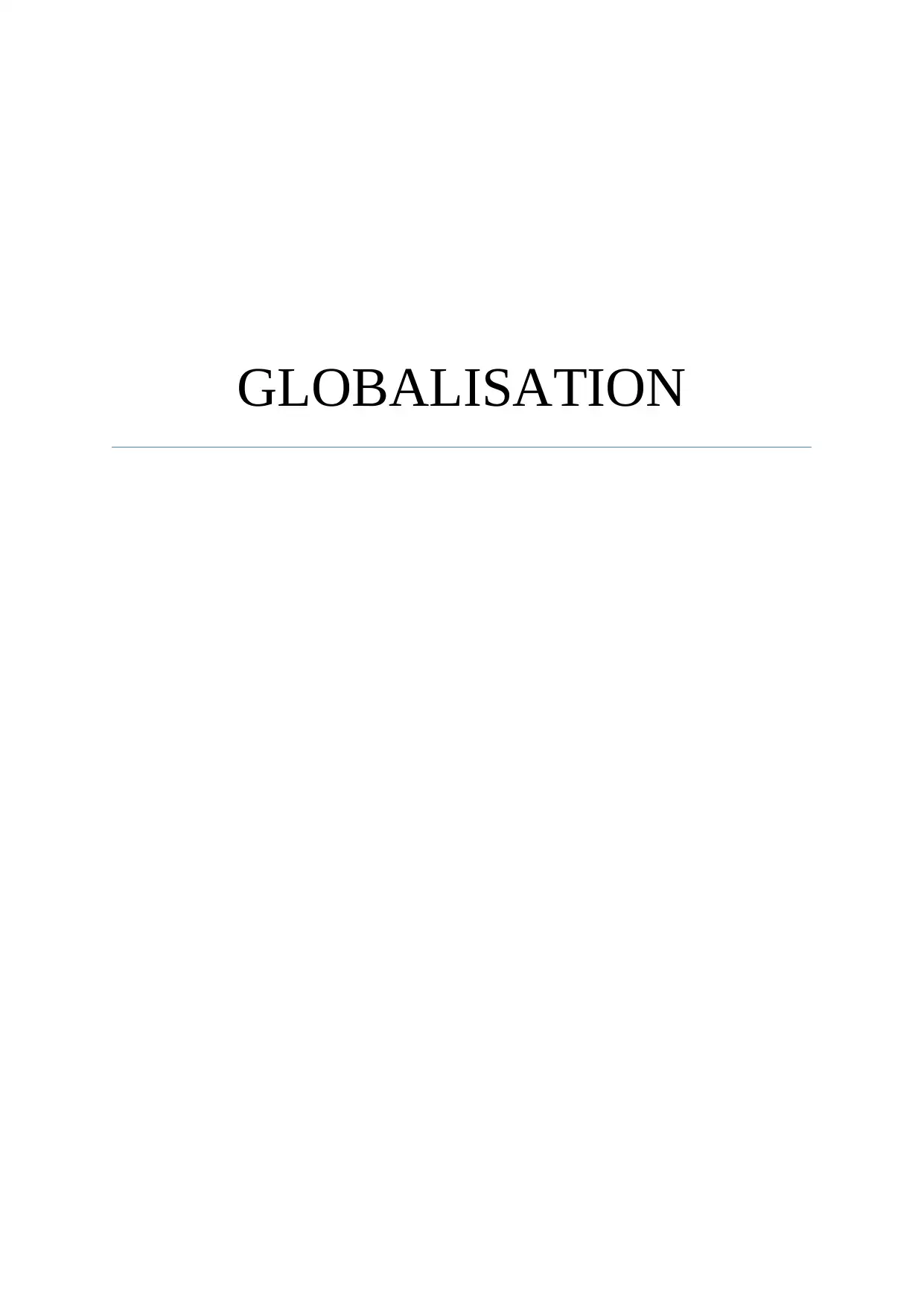
GLOBALISATION
Paraphrase This Document
Need a fresh take? Get an instant paraphrase of this document with our AI Paraphraser
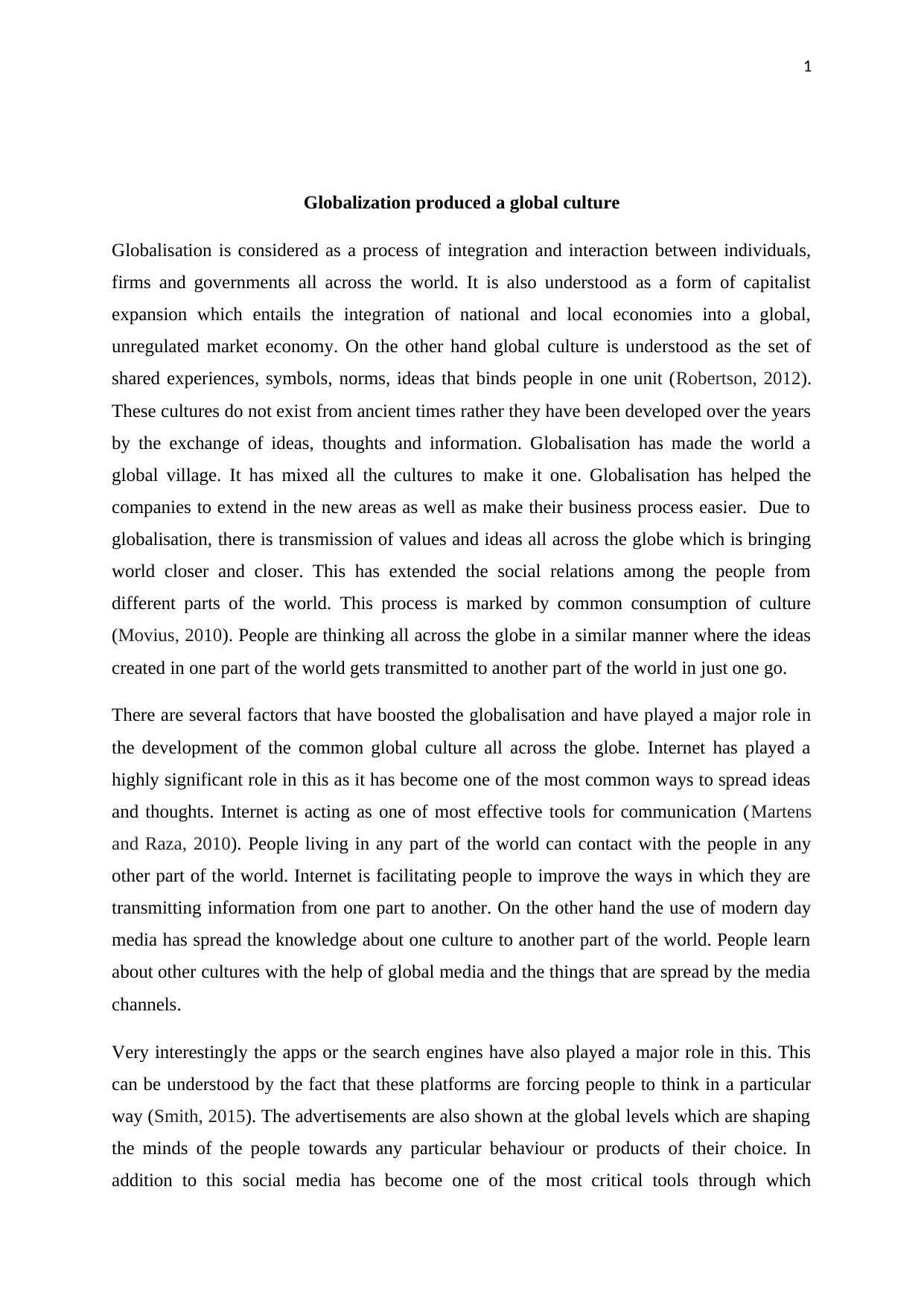
1
Globalization produced a global culture
Globalisation is considered as a process of integration and interaction between individuals,
firms and governments all across the world. It is also understood as a form of capitalist
expansion which entails the integration of national and local economies into a global,
unregulated market economy. On the other hand global culture is understood as the set of
shared experiences, symbols, norms, ideas that binds people in one unit (Robertson, 2012).
These cultures do not exist from ancient times rather they have been developed over the years
by the exchange of ideas, thoughts and information. Globalisation has made the world a
global village. It has mixed all the cultures to make it one. Globalisation has helped the
companies to extend in the new areas as well as make their business process easier. Due to
globalisation, there is transmission of values and ideas all across the globe which is bringing
world closer and closer. This has extended the social relations among the people from
different parts of the world. This process is marked by common consumption of culture
(Movius, 2010). People are thinking all across the globe in a similar manner where the ideas
created in one part of the world gets transmitted to another part of the world in just one go.
There are several factors that have boosted the globalisation and have played a major role in
the development of the common global culture all across the globe. Internet has played a
highly significant role in this as it has become one of the most common ways to spread ideas
and thoughts. Internet is acting as one of most effective tools for communication (Martens
and Raza, 2010). People living in any part of the world can contact with the people in any
other part of the world. Internet is facilitating people to improve the ways in which they are
transmitting information from one part to another. On the other hand the use of modern day
media has spread the knowledge about one culture to another part of the world. People learn
about other cultures with the help of global media and the things that are spread by the media
channels.
Very interestingly the apps or the search engines have also played a major role in this. This
can be understood by the fact that these platforms are forcing people to think in a particular
way (Smith, 2015). The advertisements are also shown at the global levels which are shaping
the minds of the people towards any particular behaviour or products of their choice. In
addition to this social media has become one of the most critical tools through which
Globalization produced a global culture
Globalisation is considered as a process of integration and interaction between individuals,
firms and governments all across the world. It is also understood as a form of capitalist
expansion which entails the integration of national and local economies into a global,
unregulated market economy. On the other hand global culture is understood as the set of
shared experiences, symbols, norms, ideas that binds people in one unit (Robertson, 2012).
These cultures do not exist from ancient times rather they have been developed over the years
by the exchange of ideas, thoughts and information. Globalisation has made the world a
global village. It has mixed all the cultures to make it one. Globalisation has helped the
companies to extend in the new areas as well as make their business process easier. Due to
globalisation, there is transmission of values and ideas all across the globe which is bringing
world closer and closer. This has extended the social relations among the people from
different parts of the world. This process is marked by common consumption of culture
(Movius, 2010). People are thinking all across the globe in a similar manner where the ideas
created in one part of the world gets transmitted to another part of the world in just one go.
There are several factors that have boosted the globalisation and have played a major role in
the development of the common global culture all across the globe. Internet has played a
highly significant role in this as it has become one of the most common ways to spread ideas
and thoughts. Internet is acting as one of most effective tools for communication (Martens
and Raza, 2010). People living in any part of the world can contact with the people in any
other part of the world. Internet is facilitating people to improve the ways in which they are
transmitting information from one part to another. On the other hand the use of modern day
media has spread the knowledge about one culture to another part of the world. People learn
about other cultures with the help of global media and the things that are spread by the media
channels.
Very interestingly the apps or the search engines have also played a major role in this. This
can be understood by the fact that these platforms are forcing people to think in a particular
way (Smith, 2015). The advertisements are also shown at the global levels which are shaping
the minds of the people towards any particular behaviour or products of their choice. In
addition to this social media has become one of the most critical tools through which
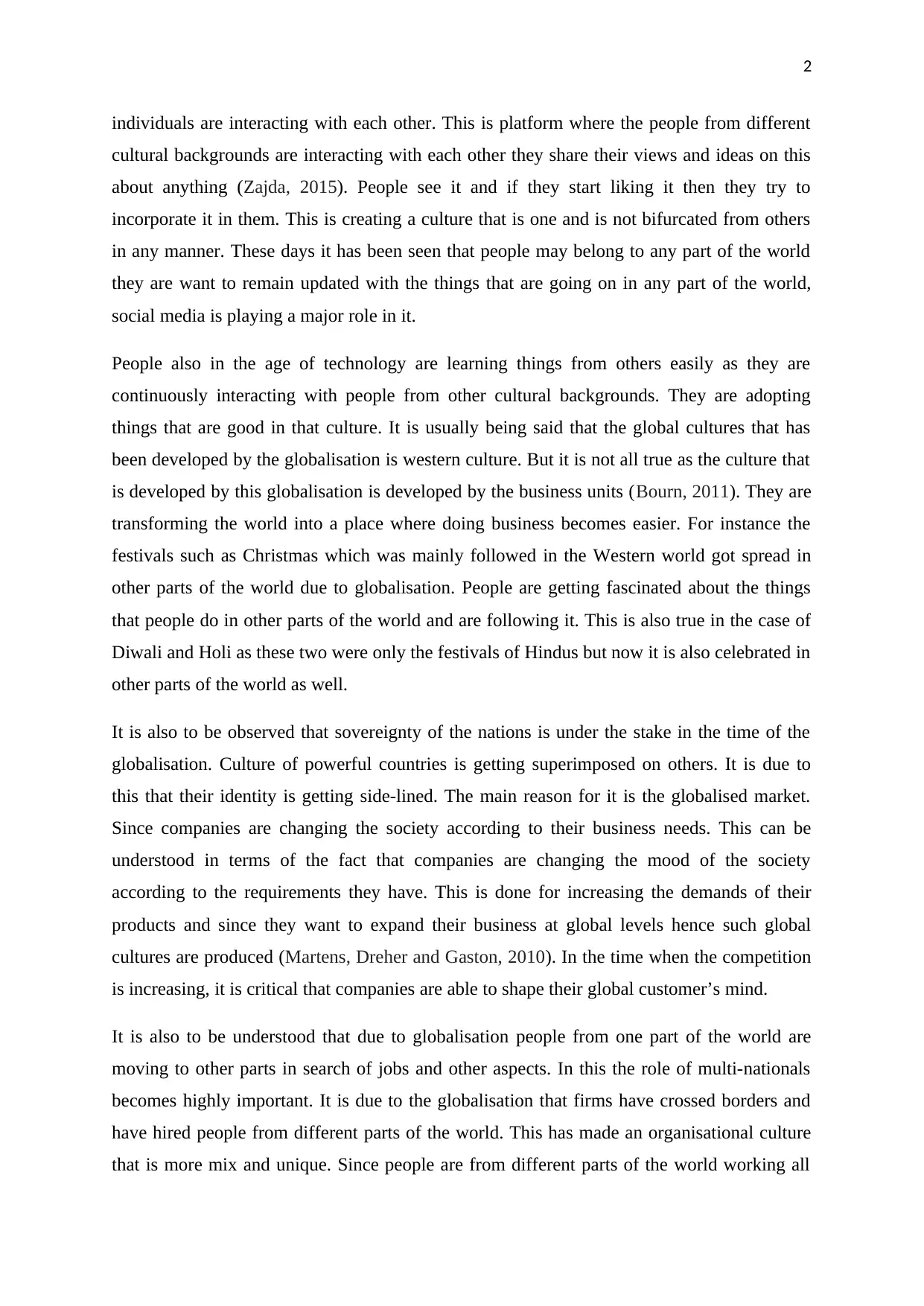
2
individuals are interacting with each other. This is platform where the people from different
cultural backgrounds are interacting with each other they share their views and ideas on this
about anything (Zajda, 2015). People see it and if they start liking it then they try to
incorporate it in them. This is creating a culture that is one and is not bifurcated from others
in any manner. These days it has been seen that people may belong to any part of the world
they are want to remain updated with the things that are going on in any part of the world,
social media is playing a major role in it.
People also in the age of technology are learning things from others easily as they are
continuously interacting with people from other cultural backgrounds. They are adopting
things that are good in that culture. It is usually being said that the global cultures that has
been developed by the globalisation is western culture. But it is not all true as the culture that
is developed by this globalisation is developed by the business units (Bourn, 2011). They are
transforming the world into a place where doing business becomes easier. For instance the
festivals such as Christmas which was mainly followed in the Western world got spread in
other parts of the world due to globalisation. People are getting fascinated about the things
that people do in other parts of the world and are following it. This is also true in the case of
Diwali and Holi as these two were only the festivals of Hindus but now it is also celebrated in
other parts of the world as well.
It is also to be observed that sovereignty of the nations is under the stake in the time of the
globalisation. Culture of powerful countries is getting superimposed on others. It is due to
this that their identity is getting side-lined. The main reason for it is the globalised market.
Since companies are changing the society according to their business needs. This can be
understood in terms of the fact that companies are changing the mood of the society
according to the requirements they have. This is done for increasing the demands of their
products and since they want to expand their business at global levels hence such global
cultures are produced (Martens, Dreher and Gaston, 2010). In the time when the competition
is increasing, it is critical that companies are able to shape their global customer’s mind.
It is also to be understood that due to globalisation people from one part of the world are
moving to other parts in search of jobs and other aspects. In this the role of multi-nationals
becomes highly important. It is due to the globalisation that firms have crossed borders and
have hired people from different parts of the world. This has made an organisational culture
that is more mix and unique. Since people are from different parts of the world working all
individuals are interacting with each other. This is platform where the people from different
cultural backgrounds are interacting with each other they share their views and ideas on this
about anything (Zajda, 2015). People see it and if they start liking it then they try to
incorporate it in them. This is creating a culture that is one and is not bifurcated from others
in any manner. These days it has been seen that people may belong to any part of the world
they are want to remain updated with the things that are going on in any part of the world,
social media is playing a major role in it.
People also in the age of technology are learning things from others easily as they are
continuously interacting with people from other cultural backgrounds. They are adopting
things that are good in that culture. It is usually being said that the global cultures that has
been developed by the globalisation is western culture. But it is not all true as the culture that
is developed by this globalisation is developed by the business units (Bourn, 2011). They are
transforming the world into a place where doing business becomes easier. For instance the
festivals such as Christmas which was mainly followed in the Western world got spread in
other parts of the world due to globalisation. People are getting fascinated about the things
that people do in other parts of the world and are following it. This is also true in the case of
Diwali and Holi as these two were only the festivals of Hindus but now it is also celebrated in
other parts of the world as well.
It is also to be observed that sovereignty of the nations is under the stake in the time of the
globalisation. Culture of powerful countries is getting superimposed on others. It is due to
this that their identity is getting side-lined. The main reason for it is the globalised market.
Since companies are changing the society according to their business needs. This can be
understood in terms of the fact that companies are changing the mood of the society
according to the requirements they have. This is done for increasing the demands of their
products and since they want to expand their business at global levels hence such global
cultures are produced (Martens, Dreher and Gaston, 2010). In the time when the competition
is increasing, it is critical that companies are able to shape their global customer’s mind.
It is also to be understood that due to globalisation people from one part of the world are
moving to other parts in search of jobs and other aspects. In this the role of multi-nationals
becomes highly important. It is due to the globalisation that firms have crossed borders and
have hired people from different parts of the world. This has made an organisational culture
that is more mix and unique. Since people are from different parts of the world working all
⊘ This is a preview!⊘
Do you want full access?
Subscribe today to unlock all pages.

Trusted by 1+ million students worldwide
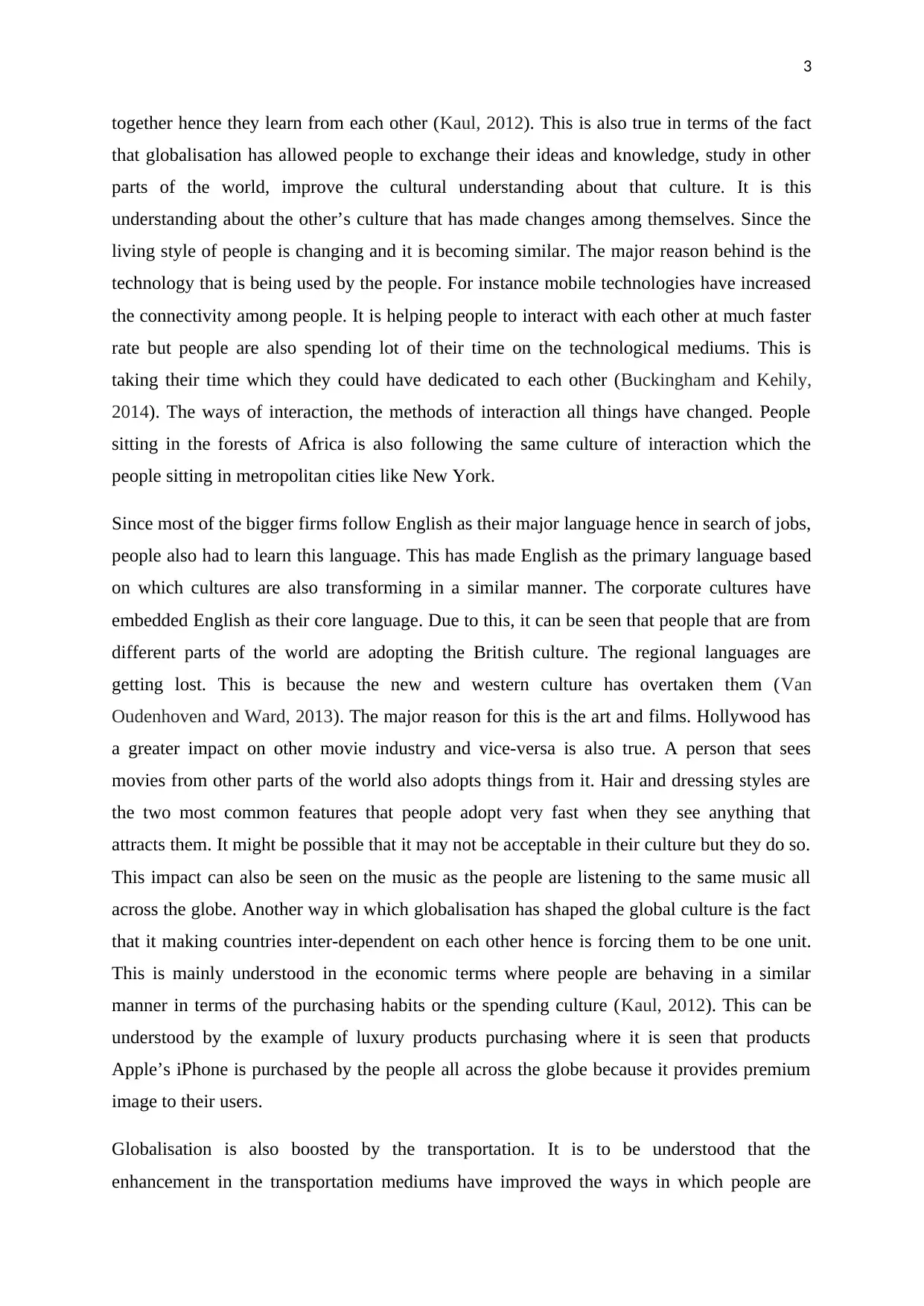
3
together hence they learn from each other (Kaul, 2012). This is also true in terms of the fact
that globalisation has allowed people to exchange their ideas and knowledge, study in other
parts of the world, improve the cultural understanding about that culture. It is this
understanding about the other’s culture that has made changes among themselves. Since the
living style of people is changing and it is becoming similar. The major reason behind is the
technology that is being used by the people. For instance mobile technologies have increased
the connectivity among people. It is helping people to interact with each other at much faster
rate but people are also spending lot of their time on the technological mediums. This is
taking their time which they could have dedicated to each other (Buckingham and Kehily,
2014). The ways of interaction, the methods of interaction all things have changed. People
sitting in the forests of Africa is also following the same culture of interaction which the
people sitting in metropolitan cities like New York.
Since most of the bigger firms follow English as their major language hence in search of jobs,
people also had to learn this language. This has made English as the primary language based
on which cultures are also transforming in a similar manner. The corporate cultures have
embedded English as their core language. Due to this, it can be seen that people that are from
different parts of the world are adopting the British culture. The regional languages are
getting lost. This is because the new and western culture has overtaken them (Van
Oudenhoven and Ward, 2013). The major reason for this is the art and films. Hollywood has
a greater impact on other movie industry and vice-versa is also true. A person that sees
movies from other parts of the world also adopts things from it. Hair and dressing styles are
the two most common features that people adopt very fast when they see anything that
attracts them. It might be possible that it may not be acceptable in their culture but they do so.
This impact can also be seen on the music as the people are listening to the same music all
across the globe. Another way in which globalisation has shaped the global culture is the fact
that it making countries inter-dependent on each other hence is forcing them to be one unit.
This is mainly understood in the economic terms where people are behaving in a similar
manner in terms of the purchasing habits or the spending culture (Kaul, 2012). This can be
understood by the example of luxury products purchasing where it is seen that products
Apple’s iPhone is purchased by the people all across the globe because it provides premium
image to their users.
Globalisation is also boosted by the transportation. It is to be understood that the
enhancement in the transportation mediums have improved the ways in which people are
together hence they learn from each other (Kaul, 2012). This is also true in terms of the fact
that globalisation has allowed people to exchange their ideas and knowledge, study in other
parts of the world, improve the cultural understanding about that culture. It is this
understanding about the other’s culture that has made changes among themselves. Since the
living style of people is changing and it is becoming similar. The major reason behind is the
technology that is being used by the people. For instance mobile technologies have increased
the connectivity among people. It is helping people to interact with each other at much faster
rate but people are also spending lot of their time on the technological mediums. This is
taking their time which they could have dedicated to each other (Buckingham and Kehily,
2014). The ways of interaction, the methods of interaction all things have changed. People
sitting in the forests of Africa is also following the same culture of interaction which the
people sitting in metropolitan cities like New York.
Since most of the bigger firms follow English as their major language hence in search of jobs,
people also had to learn this language. This has made English as the primary language based
on which cultures are also transforming in a similar manner. The corporate cultures have
embedded English as their core language. Due to this, it can be seen that people that are from
different parts of the world are adopting the British culture. The regional languages are
getting lost. This is because the new and western culture has overtaken them (Van
Oudenhoven and Ward, 2013). The major reason for this is the art and films. Hollywood has
a greater impact on other movie industry and vice-versa is also true. A person that sees
movies from other parts of the world also adopts things from it. Hair and dressing styles are
the two most common features that people adopt very fast when they see anything that
attracts them. It might be possible that it may not be acceptable in their culture but they do so.
This impact can also be seen on the music as the people are listening to the same music all
across the globe. Another way in which globalisation has shaped the global culture is the fact
that it making countries inter-dependent on each other hence is forcing them to be one unit.
This is mainly understood in the economic terms where people are behaving in a similar
manner in terms of the purchasing habits or the spending culture (Kaul, 2012). This can be
understood by the example of luxury products purchasing where it is seen that products
Apple’s iPhone is purchased by the people all across the globe because it provides premium
image to their users.
Globalisation is also boosted by the transportation. It is to be understood that the
enhancement in the transportation mediums have improved the ways in which people are
Paraphrase This Document
Need a fresh take? Get an instant paraphrase of this document with our AI Paraphraser
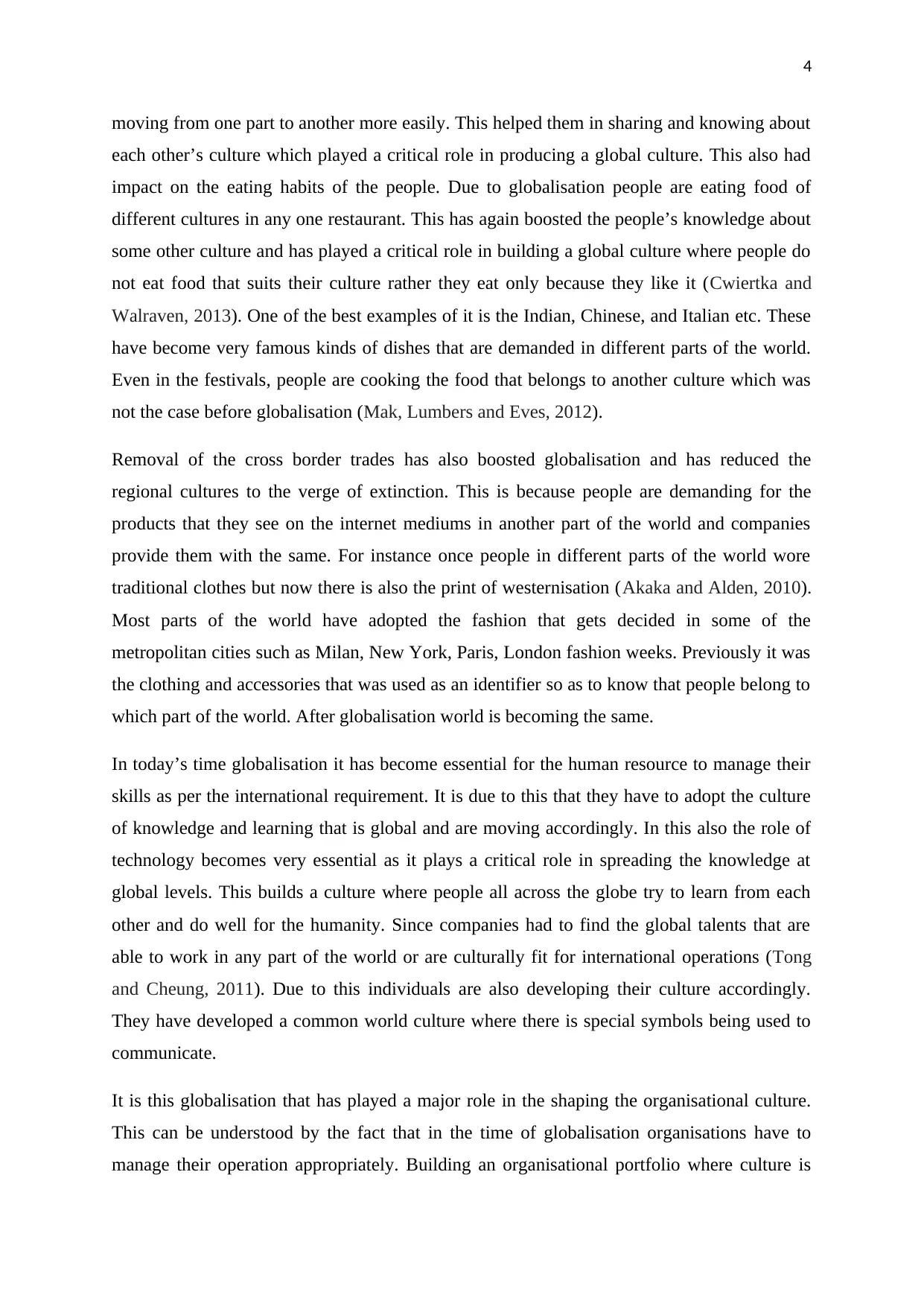
4
moving from one part to another more easily. This helped them in sharing and knowing about
each other’s culture which played a critical role in producing a global culture. This also had
impact on the eating habits of the people. Due to globalisation people are eating food of
different cultures in any one restaurant. This has again boosted the people’s knowledge about
some other culture and has played a critical role in building a global culture where people do
not eat food that suits their culture rather they eat only because they like it (Cwiertka and
Walraven, 2013). One of the best examples of it is the Indian, Chinese, and Italian etc. These
have become very famous kinds of dishes that are demanded in different parts of the world.
Even in the festivals, people are cooking the food that belongs to another culture which was
not the case before globalisation (Mak, Lumbers and Eves, 2012).
Removal of the cross border trades has also boosted globalisation and has reduced the
regional cultures to the verge of extinction. This is because people are demanding for the
products that they see on the internet mediums in another part of the world and companies
provide them with the same. For instance once people in different parts of the world wore
traditional clothes but now there is also the print of westernisation (Akaka and Alden, 2010).
Most parts of the world have adopted the fashion that gets decided in some of the
metropolitan cities such as Milan, New York, Paris, London fashion weeks. Previously it was
the clothing and accessories that was used as an identifier so as to know that people belong to
which part of the world. After globalisation world is becoming the same.
In today’s time globalisation it has become essential for the human resource to manage their
skills as per the international requirement. It is due to this that they have to adopt the culture
of knowledge and learning that is global and are moving accordingly. In this also the role of
technology becomes very essential as it plays a critical role in spreading the knowledge at
global levels. This builds a culture where people all across the globe try to learn from each
other and do well for the humanity. Since companies had to find the global talents that are
able to work in any part of the world or are culturally fit for international operations (Tong
and Cheung, 2011). Due to this individuals are also developing their culture accordingly.
They have developed a common world culture where there is special symbols being used to
communicate.
It is this globalisation that has played a major role in the shaping the organisational culture.
This can be understood by the fact that in the time of globalisation organisations have to
manage their operation appropriately. Building an organisational portfolio where culture is
moving from one part to another more easily. This helped them in sharing and knowing about
each other’s culture which played a critical role in producing a global culture. This also had
impact on the eating habits of the people. Due to globalisation people are eating food of
different cultures in any one restaurant. This has again boosted the people’s knowledge about
some other culture and has played a critical role in building a global culture where people do
not eat food that suits their culture rather they eat only because they like it (Cwiertka and
Walraven, 2013). One of the best examples of it is the Indian, Chinese, and Italian etc. These
have become very famous kinds of dishes that are demanded in different parts of the world.
Even in the festivals, people are cooking the food that belongs to another culture which was
not the case before globalisation (Mak, Lumbers and Eves, 2012).
Removal of the cross border trades has also boosted globalisation and has reduced the
regional cultures to the verge of extinction. This is because people are demanding for the
products that they see on the internet mediums in another part of the world and companies
provide them with the same. For instance once people in different parts of the world wore
traditional clothes but now there is also the print of westernisation (Akaka and Alden, 2010).
Most parts of the world have adopted the fashion that gets decided in some of the
metropolitan cities such as Milan, New York, Paris, London fashion weeks. Previously it was
the clothing and accessories that was used as an identifier so as to know that people belong to
which part of the world. After globalisation world is becoming the same.
In today’s time globalisation it has become essential for the human resource to manage their
skills as per the international requirement. It is due to this that they have to adopt the culture
of knowledge and learning that is global and are moving accordingly. In this also the role of
technology becomes very essential as it plays a critical role in spreading the knowledge at
global levels. This builds a culture where people all across the globe try to learn from each
other and do well for the humanity. Since companies had to find the global talents that are
able to work in any part of the world or are culturally fit for international operations (Tong
and Cheung, 2011). Due to this individuals are also developing their culture accordingly.
They have developed a common world culture where there is special symbols being used to
communicate.
It is this globalisation that has played a major role in the shaping the organisational culture.
This can be understood by the fact that in the time of globalisation organisations have to
manage their operation appropriately. Building an organisational portfolio where culture is
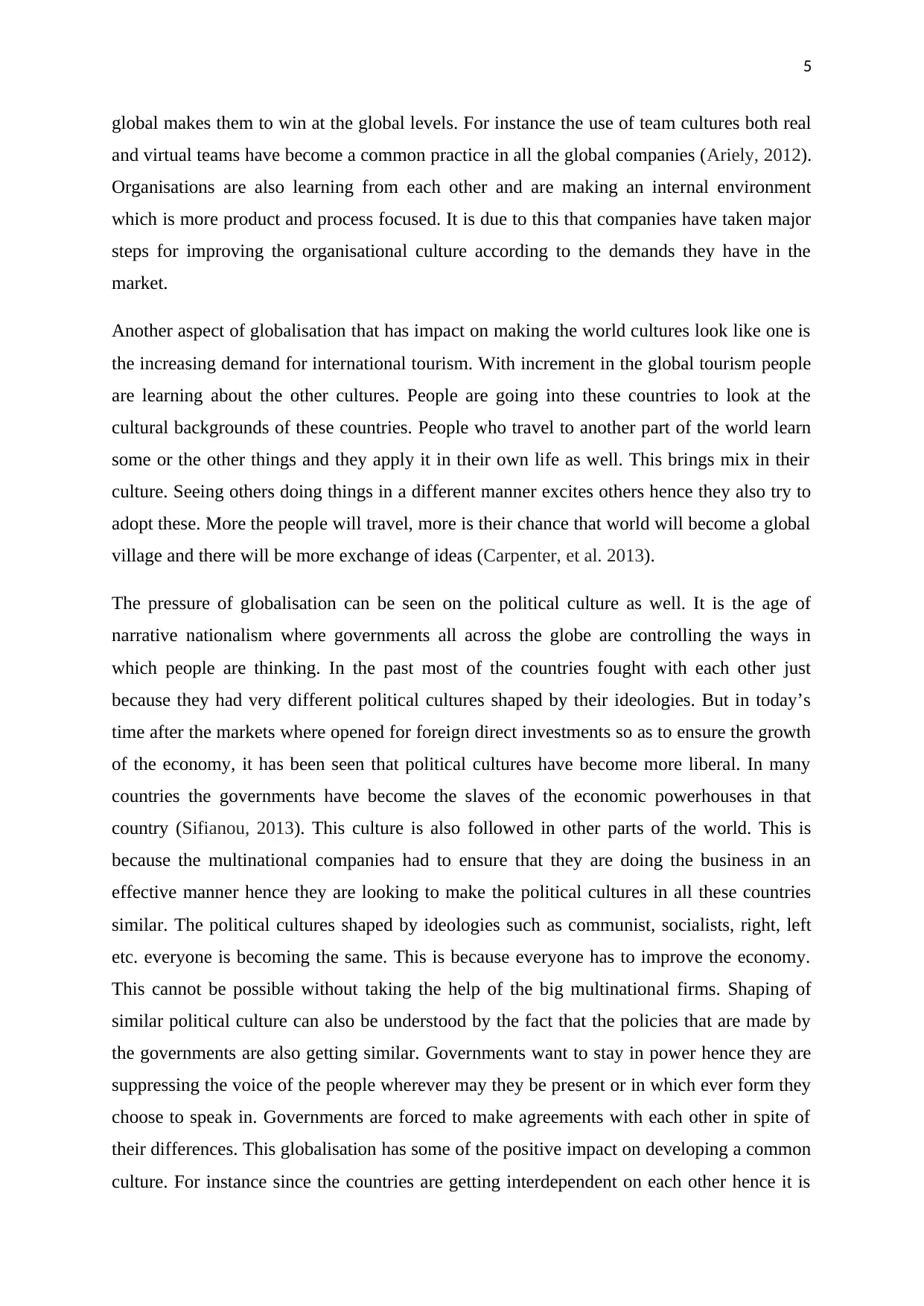
5
global makes them to win at the global levels. For instance the use of team cultures both real
and virtual teams have become a common practice in all the global companies (Ariely, 2012).
Organisations are also learning from each other and are making an internal environment
which is more product and process focused. It is due to this that companies have taken major
steps for improving the organisational culture according to the demands they have in the
market.
Another aspect of globalisation that has impact on making the world cultures look like one is
the increasing demand for international tourism. With increment in the global tourism people
are learning about the other cultures. People are going into these countries to look at the
cultural backgrounds of these countries. People who travel to another part of the world learn
some or the other things and they apply it in their own life as well. This brings mix in their
culture. Seeing others doing things in a different manner excites others hence they also try to
adopt these. More the people will travel, more is their chance that world will become a global
village and there will be more exchange of ideas (Carpenter, et al. 2013).
The pressure of globalisation can be seen on the political culture as well. It is the age of
narrative nationalism where governments all across the globe are controlling the ways in
which people are thinking. In the past most of the countries fought with each other just
because they had very different political cultures shaped by their ideologies. But in today’s
time after the markets where opened for foreign direct investments so as to ensure the growth
of the economy, it has been seen that political cultures have become more liberal. In many
countries the governments have become the slaves of the economic powerhouses in that
country (Sifianou, 2013). This culture is also followed in other parts of the world. This is
because the multinational companies had to ensure that they are doing the business in an
effective manner hence they are looking to make the political cultures in all these countries
similar. The political cultures shaped by ideologies such as communist, socialists, right, left
etc. everyone is becoming the same. This is because everyone has to improve the economy.
This cannot be possible without taking the help of the big multinational firms. Shaping of
similar political culture can also be understood by the fact that the policies that are made by
the governments are also getting similar. Governments want to stay in power hence they are
suppressing the voice of the people wherever may they be present or in which ever form they
choose to speak in. Governments are forced to make agreements with each other in spite of
their differences. This globalisation has some of the positive impact on developing a common
culture. For instance since the countries are getting interdependent on each other hence it is
global makes them to win at the global levels. For instance the use of team cultures both real
and virtual teams have become a common practice in all the global companies (Ariely, 2012).
Organisations are also learning from each other and are making an internal environment
which is more product and process focused. It is due to this that companies have taken major
steps for improving the organisational culture according to the demands they have in the
market.
Another aspect of globalisation that has impact on making the world cultures look like one is
the increasing demand for international tourism. With increment in the global tourism people
are learning about the other cultures. People are going into these countries to look at the
cultural backgrounds of these countries. People who travel to another part of the world learn
some or the other things and they apply it in their own life as well. This brings mix in their
culture. Seeing others doing things in a different manner excites others hence they also try to
adopt these. More the people will travel, more is their chance that world will become a global
village and there will be more exchange of ideas (Carpenter, et al. 2013).
The pressure of globalisation can be seen on the political culture as well. It is the age of
narrative nationalism where governments all across the globe are controlling the ways in
which people are thinking. In the past most of the countries fought with each other just
because they had very different political cultures shaped by their ideologies. But in today’s
time after the markets where opened for foreign direct investments so as to ensure the growth
of the economy, it has been seen that political cultures have become more liberal. In many
countries the governments have become the slaves of the economic powerhouses in that
country (Sifianou, 2013). This culture is also followed in other parts of the world. This is
because the multinational companies had to ensure that they are doing the business in an
effective manner hence they are looking to make the political cultures in all these countries
similar. The political cultures shaped by ideologies such as communist, socialists, right, left
etc. everyone is becoming the same. This is because everyone has to improve the economy.
This cannot be possible without taking the help of the big multinational firms. Shaping of
similar political culture can also be understood by the fact that the policies that are made by
the governments are also getting similar. Governments want to stay in power hence they are
suppressing the voice of the people wherever may they be present or in which ever form they
choose to speak in. Governments are forced to make agreements with each other in spite of
their differences. This globalisation has some of the positive impact on developing a common
culture. For instance since the countries are getting interdependent on each other hence it is
⊘ This is a preview!⊘
Do you want full access?
Subscribe today to unlock all pages.

Trusted by 1+ million students worldwide
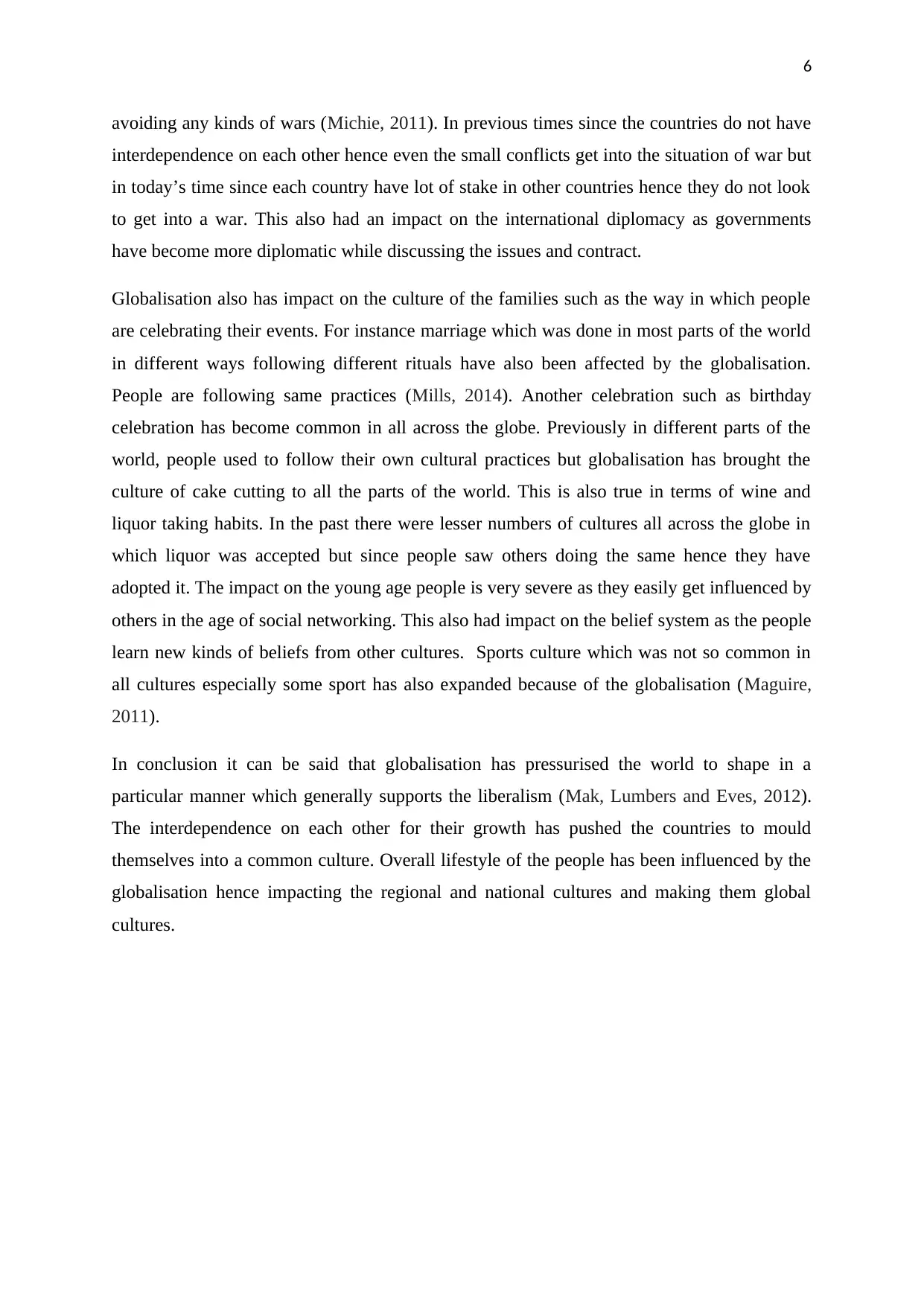
6
avoiding any kinds of wars (Michie, 2011). In previous times since the countries do not have
interdependence on each other hence even the small conflicts get into the situation of war but
in today’s time since each country have lot of stake in other countries hence they do not look
to get into a war. This also had an impact on the international diplomacy as governments
have become more diplomatic while discussing the issues and contract.
Globalisation also has impact on the culture of the families such as the way in which people
are celebrating their events. For instance marriage which was done in most parts of the world
in different ways following different rituals have also been affected by the globalisation.
People are following same practices (Mills, 2014). Another celebration such as birthday
celebration has become common in all across the globe. Previously in different parts of the
world, people used to follow their own cultural practices but globalisation has brought the
culture of cake cutting to all the parts of the world. This is also true in terms of wine and
liquor taking habits. In the past there were lesser numbers of cultures all across the globe in
which liquor was accepted but since people saw others doing the same hence they have
adopted it. The impact on the young age people is very severe as they easily get influenced by
others in the age of social networking. This also had impact on the belief system as the people
learn new kinds of beliefs from other cultures. Sports culture which was not so common in
all cultures especially some sport has also expanded because of the globalisation (Maguire,
2011).
In conclusion it can be said that globalisation has pressurised the world to shape in a
particular manner which generally supports the liberalism (Mak, Lumbers and Eves, 2012).
The interdependence on each other for their growth has pushed the countries to mould
themselves into a common culture. Overall lifestyle of the people has been influenced by the
globalisation hence impacting the regional and national cultures and making them global
cultures.
avoiding any kinds of wars (Michie, 2011). In previous times since the countries do not have
interdependence on each other hence even the small conflicts get into the situation of war but
in today’s time since each country have lot of stake in other countries hence they do not look
to get into a war. This also had an impact on the international diplomacy as governments
have become more diplomatic while discussing the issues and contract.
Globalisation also has impact on the culture of the families such as the way in which people
are celebrating their events. For instance marriage which was done in most parts of the world
in different ways following different rituals have also been affected by the globalisation.
People are following same practices (Mills, 2014). Another celebration such as birthday
celebration has become common in all across the globe. Previously in different parts of the
world, people used to follow their own cultural practices but globalisation has brought the
culture of cake cutting to all the parts of the world. This is also true in terms of wine and
liquor taking habits. In the past there were lesser numbers of cultures all across the globe in
which liquor was accepted but since people saw others doing the same hence they have
adopted it. The impact on the young age people is very severe as they easily get influenced by
others in the age of social networking. This also had impact on the belief system as the people
learn new kinds of beliefs from other cultures. Sports culture which was not so common in
all cultures especially some sport has also expanded because of the globalisation (Maguire,
2011).
In conclusion it can be said that globalisation has pressurised the world to shape in a
particular manner which generally supports the liberalism (Mak, Lumbers and Eves, 2012).
The interdependence on each other for their growth has pushed the countries to mould
themselves into a common culture. Overall lifestyle of the people has been influenced by the
globalisation hence impacting the regional and national cultures and making them global
cultures.
Paraphrase This Document
Need a fresh take? Get an instant paraphrase of this document with our AI Paraphraser
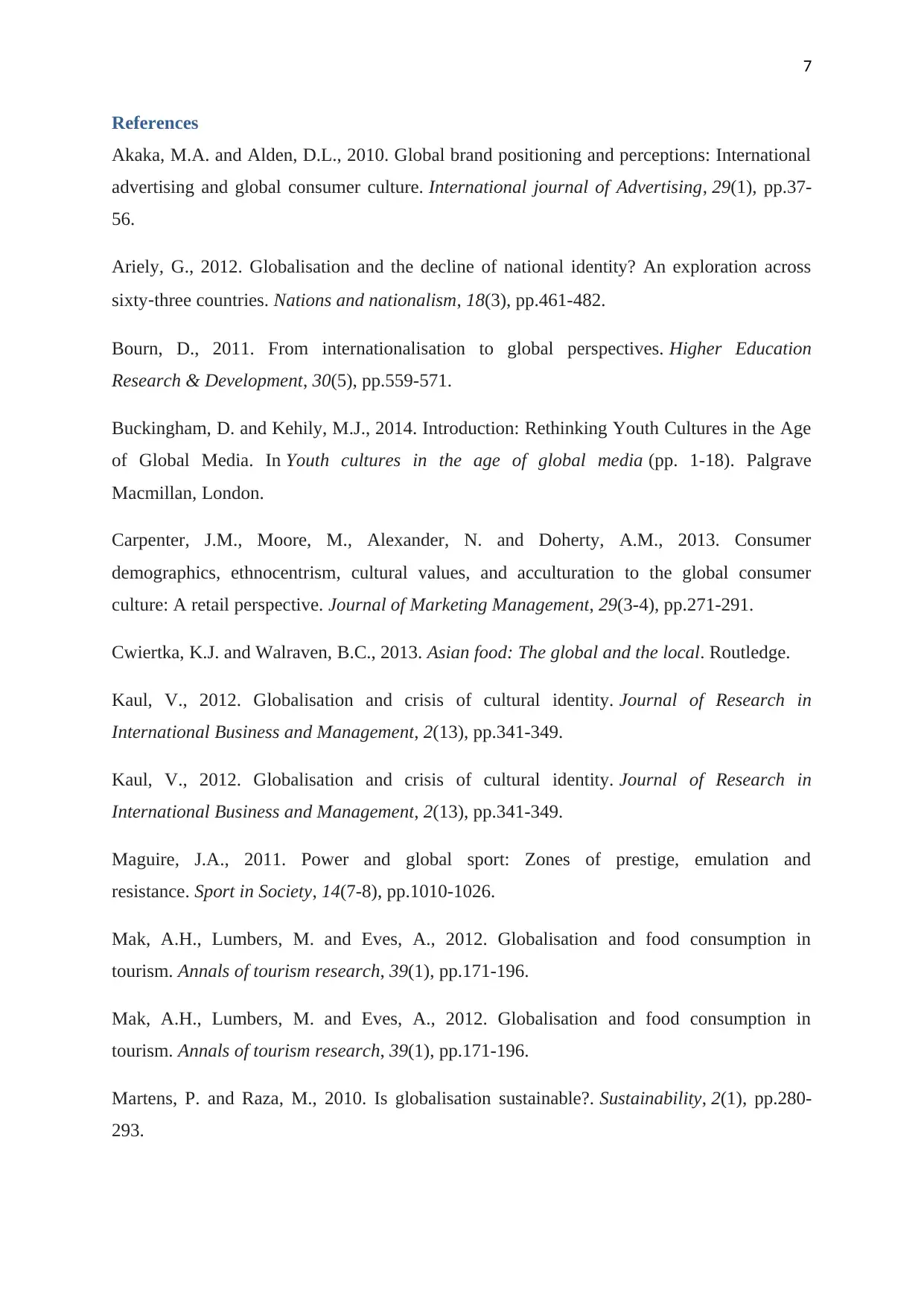
7
References
Akaka, M.A. and Alden, D.L., 2010. Global brand positioning and perceptions: International
advertising and global consumer culture. International journal of Advertising, 29(1), pp.37-
56.
Ariely, G., 2012. Globalisation and the decline of national identity? An exploration across
sixty‐three countries. Nations and nationalism, 18(3), pp.461-482.
Bourn, D., 2011. From internationalisation to global perspectives. Higher Education
Research & Development, 30(5), pp.559-571.
Buckingham, D. and Kehily, M.J., 2014. Introduction: Rethinking Youth Cultures in the Age
of Global Media. In Youth cultures in the age of global media (pp. 1-18). Palgrave
Macmillan, London.
Carpenter, J.M., Moore, M., Alexander, N. and Doherty, A.M., 2013. Consumer
demographics, ethnocentrism, cultural values, and acculturation to the global consumer
culture: A retail perspective. Journal of Marketing Management, 29(3-4), pp.271-291.
Cwiertka, K.J. and Walraven, B.C., 2013. Asian food: The global and the local. Routledge.
Kaul, V., 2012. Globalisation and crisis of cultural identity. Journal of Research in
International Business and Management, 2(13), pp.341-349.
Kaul, V., 2012. Globalisation and crisis of cultural identity. Journal of Research in
International Business and Management, 2(13), pp.341-349.
Maguire, J.A., 2011. Power and global sport: Zones of prestige, emulation and
resistance. Sport in Society, 14(7-8), pp.1010-1026.
Mak, A.H., Lumbers, M. and Eves, A., 2012. Globalisation and food consumption in
tourism. Annals of tourism research, 39(1), pp.171-196.
Mak, A.H., Lumbers, M. and Eves, A., 2012. Globalisation and food consumption in
tourism. Annals of tourism research, 39(1), pp.171-196.
Martens, P. and Raza, M., 2010. Is globalisation sustainable?. Sustainability, 2(1), pp.280-
293.
References
Akaka, M.A. and Alden, D.L., 2010. Global brand positioning and perceptions: International
advertising and global consumer culture. International journal of Advertising, 29(1), pp.37-
56.
Ariely, G., 2012. Globalisation and the decline of national identity? An exploration across
sixty‐three countries. Nations and nationalism, 18(3), pp.461-482.
Bourn, D., 2011. From internationalisation to global perspectives. Higher Education
Research & Development, 30(5), pp.559-571.
Buckingham, D. and Kehily, M.J., 2014. Introduction: Rethinking Youth Cultures in the Age
of Global Media. In Youth cultures in the age of global media (pp. 1-18). Palgrave
Macmillan, London.
Carpenter, J.M., Moore, M., Alexander, N. and Doherty, A.M., 2013. Consumer
demographics, ethnocentrism, cultural values, and acculturation to the global consumer
culture: A retail perspective. Journal of Marketing Management, 29(3-4), pp.271-291.
Cwiertka, K.J. and Walraven, B.C., 2013. Asian food: The global and the local. Routledge.
Kaul, V., 2012. Globalisation and crisis of cultural identity. Journal of Research in
International Business and Management, 2(13), pp.341-349.
Kaul, V., 2012. Globalisation and crisis of cultural identity. Journal of Research in
International Business and Management, 2(13), pp.341-349.
Maguire, J.A., 2011. Power and global sport: Zones of prestige, emulation and
resistance. Sport in Society, 14(7-8), pp.1010-1026.
Mak, A.H., Lumbers, M. and Eves, A., 2012. Globalisation and food consumption in
tourism. Annals of tourism research, 39(1), pp.171-196.
Mak, A.H., Lumbers, M. and Eves, A., 2012. Globalisation and food consumption in
tourism. Annals of tourism research, 39(1), pp.171-196.
Martens, P. and Raza, M., 2010. Is globalisation sustainable?. Sustainability, 2(1), pp.280-
293.
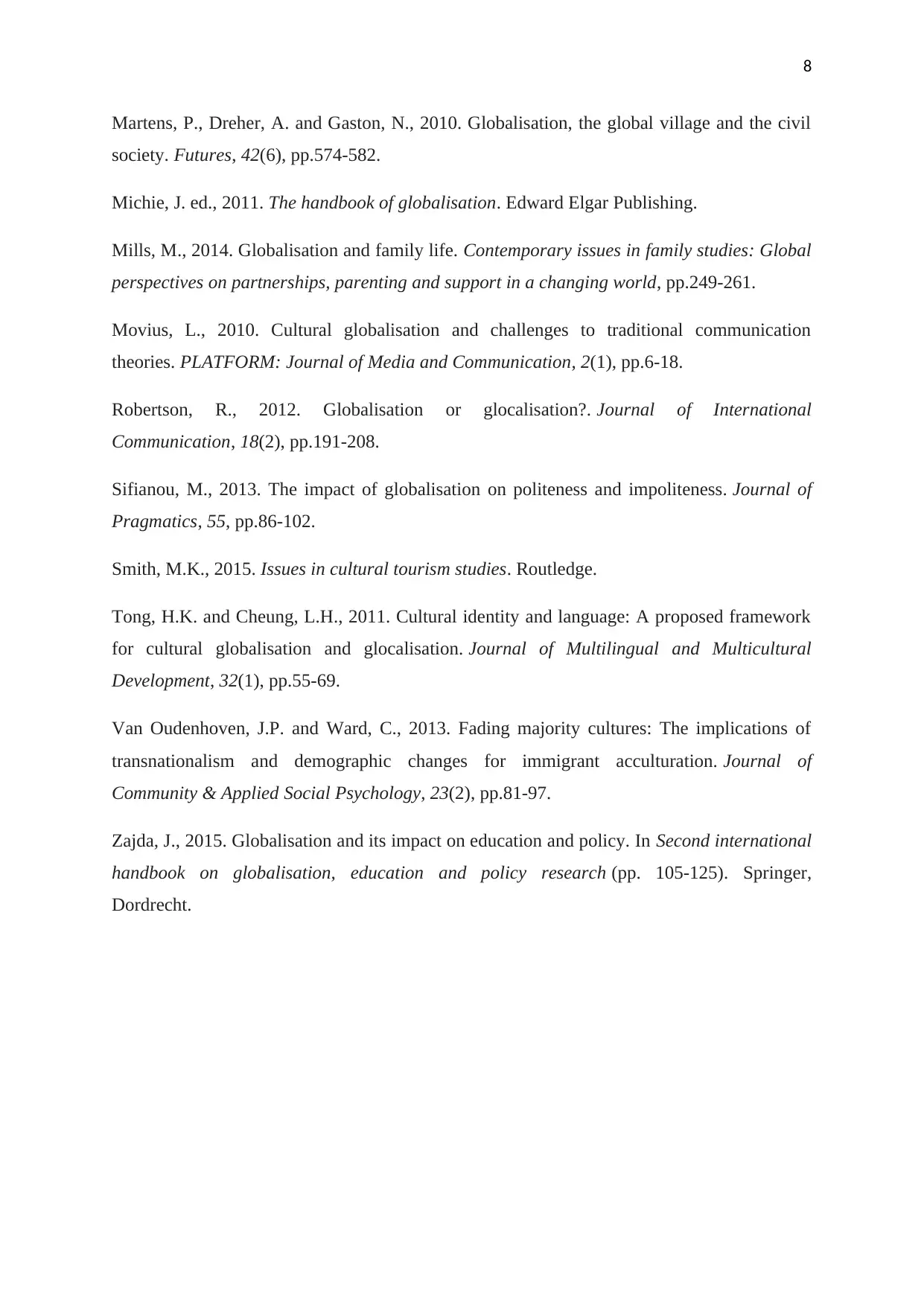
8
Martens, P., Dreher, A. and Gaston, N., 2010. Globalisation, the global village and the civil
society. Futures, 42(6), pp.574-582.
Michie, J. ed., 2011. The handbook of globalisation. Edward Elgar Publishing.
Mills, M., 2014. Globalisation and family life. Contemporary issues in family studies: Global
perspectives on partnerships, parenting and support in a changing world, pp.249-261.
Movius, L., 2010. Cultural globalisation and challenges to traditional communication
theories. PLATFORM: Journal of Media and Communication, 2(1), pp.6-18.
Robertson, R., 2012. Globalisation or glocalisation?. Journal of International
Communication, 18(2), pp.191-208.
Sifianou, M., 2013. The impact of globalisation on politeness and impoliteness. Journal of
Pragmatics, 55, pp.86-102.
Smith, M.K., 2015. Issues in cultural tourism studies. Routledge.
Tong, H.K. and Cheung, L.H., 2011. Cultural identity and language: A proposed framework
for cultural globalisation and glocalisation. Journal of Multilingual and Multicultural
Development, 32(1), pp.55-69.
Van Oudenhoven, J.P. and Ward, C., 2013. Fading majority cultures: The implications of
transnationalism and demographic changes for immigrant acculturation. Journal of
Community & Applied Social Psychology, 23(2), pp.81-97.
Zajda, J., 2015. Globalisation and its impact on education and policy. In Second international
handbook on globalisation, education and policy research (pp. 105-125). Springer,
Dordrecht.
Martens, P., Dreher, A. and Gaston, N., 2010. Globalisation, the global village and the civil
society. Futures, 42(6), pp.574-582.
Michie, J. ed., 2011. The handbook of globalisation. Edward Elgar Publishing.
Mills, M., 2014. Globalisation and family life. Contemporary issues in family studies: Global
perspectives on partnerships, parenting and support in a changing world, pp.249-261.
Movius, L., 2010. Cultural globalisation and challenges to traditional communication
theories. PLATFORM: Journal of Media and Communication, 2(1), pp.6-18.
Robertson, R., 2012. Globalisation or glocalisation?. Journal of International
Communication, 18(2), pp.191-208.
Sifianou, M., 2013. The impact of globalisation on politeness and impoliteness. Journal of
Pragmatics, 55, pp.86-102.
Smith, M.K., 2015. Issues in cultural tourism studies. Routledge.
Tong, H.K. and Cheung, L.H., 2011. Cultural identity and language: A proposed framework
for cultural globalisation and glocalisation. Journal of Multilingual and Multicultural
Development, 32(1), pp.55-69.
Van Oudenhoven, J.P. and Ward, C., 2013. Fading majority cultures: The implications of
transnationalism and demographic changes for immigrant acculturation. Journal of
Community & Applied Social Psychology, 23(2), pp.81-97.
Zajda, J., 2015. Globalisation and its impact on education and policy. In Second international
handbook on globalisation, education and policy research (pp. 105-125). Springer,
Dordrecht.
⊘ This is a preview!⊘
Do you want full access?
Subscribe today to unlock all pages.

Trusted by 1+ million students worldwide
1 out of 9
Related Documents
Your All-in-One AI-Powered Toolkit for Academic Success.
+13062052269
info@desklib.com
Available 24*7 on WhatsApp / Email
![[object Object]](/_next/static/media/star-bottom.7253800d.svg)
Unlock your academic potential
Copyright © 2020–2026 A2Z Services. All Rights Reserved. Developed and managed by ZUCOL.





